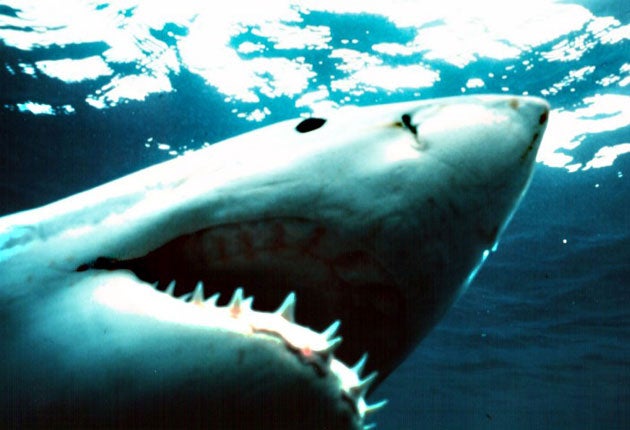Hi, gr8 white here – strvng. Cn we mt 4 lunch? C U l8er
Australian scientists develop revolutionary tracking system that texts the authorities whenever a killer shark nears the beach

It is probably the most feared creature in the ocean, immortalised in the 1970s horror movie Jaws. Now Australian scientists are using pioneering technology to fight the great white shark, electronically tagging 100 of the man-eating predators and alerting swimmers whenever they approach Perth beaches.
In a world first, the West Australian Department of Fisheries is installing 20 satellite receivers along the Perth coastline which will send a signal whenever a tagged shark comes within 500 metres. A couple of minutes later, an email or SMS will be sent to government departments, scientists, wildlife officials and lifeguards.
The technology is not new, but has never been used for "real-time" tracking of sharks, according to the department's senior research scientist, Rory McAuley. He said yesterday that a two-year study would analyse the movements and migration patterns of great whites – or white pointers, as they are also known – along the coast.
More than 70 sharks have already been tagged, with researchers shooting or stabbing the devices into the creatures' flanks when they pause to feed on whale carcasses. The acoustic receivers, which are being installed on the seabed near popular beaches, will all be in place by February.
The news may reassure Perth residents, for whom sharks are an ever-present threat. Nine years ago, a man was killed by a white pointer in waist-deep water off Cottesloe Beach, one of the city's favourite coastal haunts. Since then, there have been a dozen shark attacks in Western Australia, two of them fatal. Earlier this year, an annual open-water race off Cottesloe was cancelled after a series of shark sightings in the area.
Dr McAuley said he hoped the data amassed during the A$400,000 (£224,500) study would provide insights into the movements of great whites and improve understanding of the risk of attacks. While it was primarily a research project, he said, the information – which will be beamed to a satellite by the receivers – would also be used to detect sharks and warn swimmers.
"The information we are hoping to collect will hopefully help us to answer questions such as how long white sharks spend off our beaches, whether they come back, is there a season, do they come back one year after the other?" Dr McAuley added: "We have put the receivers out the front of surf lifesaving clubs, because... if we are able to implement a response, that is where it is most likely to happen."
The state government already has a Shark Incident Emergency Response Plan, which is implemented when sharks are spotted off beaches.
Since three of the monitoring stations were installed earlier this year, sharks have been detected in Perth waters on four occasions, most recently in September. Dr McAuley said it was too early to draw useful conclusions about the predators' habits.
He believes the government-funded study may make locals more relaxed about bathing off the city's beaches. "I think the public's fear of sharks stems largely from a fear of the unknown," he said, adding that anything that helps clarify the real risk of people encountering sharks at the beach will "hopefully alleviate people's concerns."
In the past, the receiver had to be taken to shore for tracking information to be downloaded. "Technology that delivers real-time notifications of tag detections hasn't been used in an operational sense anywhere else in the world," he added.
Join our commenting forum
Join thought-provoking conversations, follow other Independent readers and see their replies
Comments
Bookmark popover
Removed from bookmarks